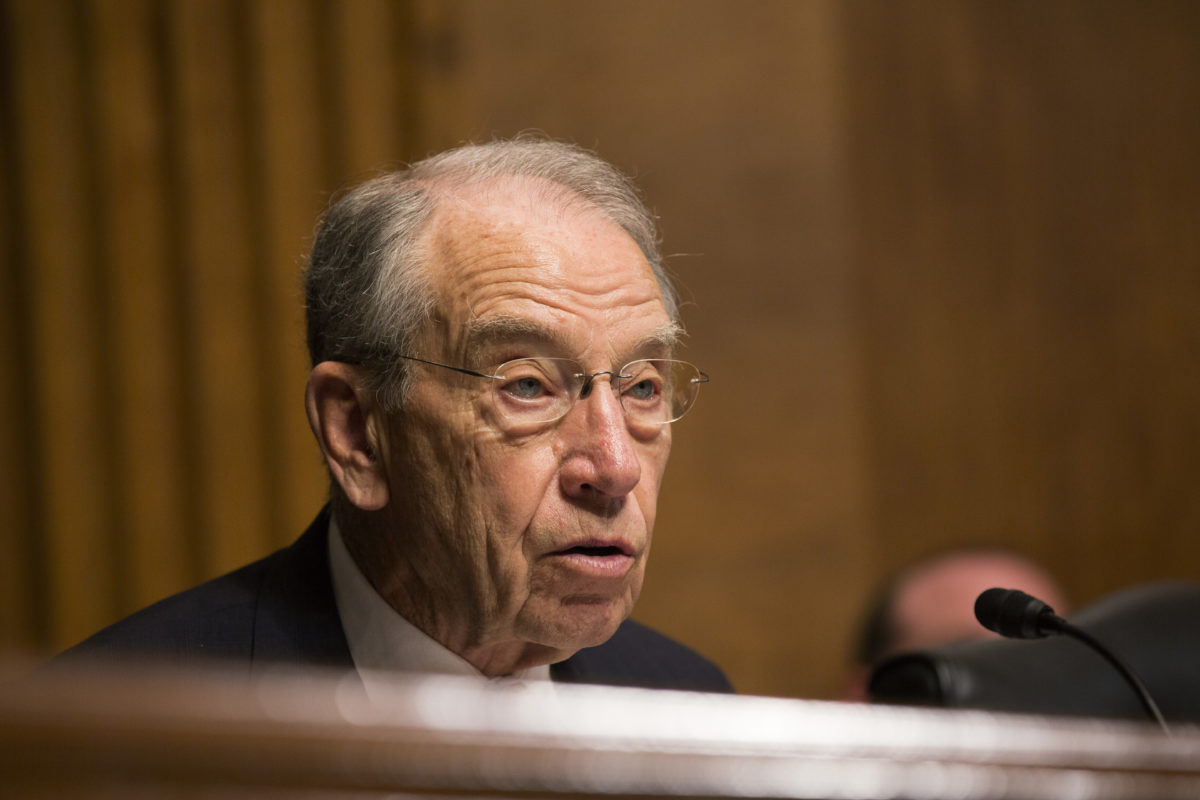Politics
Grassley Defends Whistleblower But Says Complaint Requires ‘Additional Leg Work’

Rep. Chuck Grassley asks U.S. Customs and Border Protection Acting Deputy Commissioner Ronald D. Vitiello questions during testimony before the Senate Judiciary Committee, Subcommittee on Border Security and Immigration, during a hearing entitled "Building America's Trust through Border Security: Progress on the Southern Border" in Washington, D.C., May 23, 2017. U.S. Customs and Border Protection Photo by Glenn Fawcett | By U.S. Customs and Border Protection (170523-H-NI589-0415) [Public domain], via Wikimedia Commons
Sen. Chuck Grassley on Tuesday defended the whistleblower who filed a complaint regarding President Donald Trump’s phone call with Ukraine’s president.
The Iowa Republican’s statement diverges from the opinions of his fellow congressional Republicans such as Sens. Lindsey Graham of South Carolina and John Cornyn of Texas, as well as California Reps. Kevin McCarthy and Devin Nunes and Ohio Rep. Jim Jordan, who have all expressed skepticism regarding the whistleblower’s second- and third-hand accounts.
“This person appears to have followed the whistleblower protection laws and ought to be heard out and protected. We should always work to respect whistleblowers’ requests for confidentiality,” Grassley wrote in his statement. “Any further media reports on the whistleblower’s identity don’t serve the public interest—even if the conflict sells more papers or attracts clicks.”
In a statement, GOP Sen. Chuck Grassley pushes back on attacks on the whistleblower, saying the individual “appears to have followed the whistleblower protection laws and ought to be heard out and protected.”
He also says there’s no legal distinction if the info is second-hand. pic.twitter.com/czIYTEsMwR
— Haley Byrd (@byrdinator) October 1, 2019
But Grassley, who chairs the powerful Senate Finance Committee, added that no judgments can be made solely on the whistleblower’s complaint because the information included did not come directly from the whistleblower.
Here’s a “new revelation” in this article: the whistleblower complaint is based on hearsay. From the article: “The whistleblower didn’t have direct knowledge of the communications, an official briefed on the matter told CNN.” https://t.co/rPPVRD88Qp
— Brit Hume (@brithume) September 21, 2019
“When it comes to whether someone qualifies as a whistleblower, the distinctions being drawn between first- and second-hand knowledge aren’t legal ones. It’s just not part of whistleblower protection law or any agency policy,” Grassley said, referring to whistleblower legislation he helped write.
“Complaints based on second-hand information should not be rejected out of hand, but they do require additional leg work to get at the facts and evaluate the claim’s credibility,” he added.
“No one should be making judgments or pronouncements without hearing from the whistleblower first and carefully following up on the facts. Uninformed speculation wielded by politicians or media commentators as a partisan weapon is counterproductive and doesn’t serve the country,” Grassley continued.
The president expressed frustration on Twitter Monday in response to reports that the intelligence community allegedly eliminated a rule requiring whistleblowers to have firsthand knowledge of an incident before filing a complaint.
WHO CHANGED THE LONG STANDING WHISTLEBLOWER RULES JUST BEFORE SUBMITTAL OF THE FAKE WHISTLEBLOWER REPORT? DRAIN THE SWAMP!
— Donald J. Trump (@realDonaldTrump) September 30, 2019
Grassley and fellow Republicans Sens. Ron Johnson of Wisconsin and Mike Lee of Utah sent a letter to Intellgigence Community Inspector General Michael Atkinson on Monday.
“We are not aware of any federal law, regulation or internal directive relating to whistleblowers that requires first-hand information in order for the complaint to be accepted as credible or receive legal protections,” they wrote.
All content created by the Daily Caller News Foundation, an independent and nonpartisan newswire service, is available without charge to any legitimate news publisher that can provide a large audience. All republished articles must include our logo, our reporter’s byline and their DCNF affiliation. For any questions about our guidelines or partnering with us, please contact [email protected].

